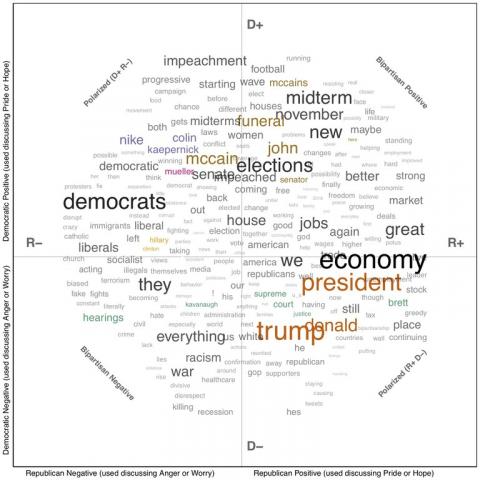
From Colin Kaepernick to Brett Kavanaugh, Americans appear to be sharply divided over the people who shape political life.
Those divides are evident in the latest McCourtney Institute Mood of the Nation Poll. The poll utilizes open-ended questions that allow participants to respond in their own words, express what’s on their minds, and provide unique observations on contemporary American politics.
Each poll asks participants to describe whatever it may be in politics or the news that made them angry, proud, worried and hopeful. Responses to the September poll reveal partisan differences concerning President Donald Trump, but also football player and activist Colin Kaepernick, Special Counsel Robert Mueller, and Supreme Court Justice Brett Kavanaugh.
A 36-year-old Democrat in Michigan cited the Mueller investigation as a source of extreme hope, saying he was looking forward to “watching Trump associates be indicted and plead guilty in federal court.”
Republicans, on the other hand, viewed the special counsel’s actions as a cause of extreme anger and skepticism, with a 54-year-old woman in Texas connecting it to the “fake news and skewed media” that she believes is tied to the Democratic Party.
Kavanaugh’s confirmation hearings also proved to be deeply dividing, with Republicans and Democrats blaming each other for unprofessional behavior during the process.
The language used in Mood of the Nation Poll responses also show deep divides across partisan lines. Words like “resistance,” “protesters,” “immigrants” and “impeachment” were used by Democrats in positive contexts and by Republicans in negative contexts — signifying hope or pride on one side and anger or worry on another.
On the other end of the spectrum, words like “tax,” “greedy,” “Donald” and “Trump” were used positively by Republicans and negatively by Democrats. “Trump” has been the single most polarizing word in every Mood of the Nation Poll since June 2016.
"In every Mood of the Nation Poll, we have seen voters use polarized language to describe their feelings about politics and the news,” said Burt Monroe, liberal arts professor of political science, social data analytics and informatics, and the Mood of the Nation Poll’s chief scientist. “We were particularly struck this time by the politically polarized reaction to public figures who aren't politicians, like Kaepernick, Mueller and Kavanaugh."
The poll also found that, not only are Americans polarized, they also are angry and tuning out politics as a result. Details of those findings were recently published in The Washington's Post's Monkey Cage.
Under the direction of Eric Plutzer, professor of political science and an affiliate faculty member in the McCourtney Institute for Democracy, each Mood of the Nation Poll reflects answers provided by a scientifically selected, representative sample of 1,000 adults. Fieldwork is conducted in partnership with YouGov, an online polling organization.
For more information on the Mood of the Nation Poll and its findings, visit the McCourtney Institute for Democracy website.